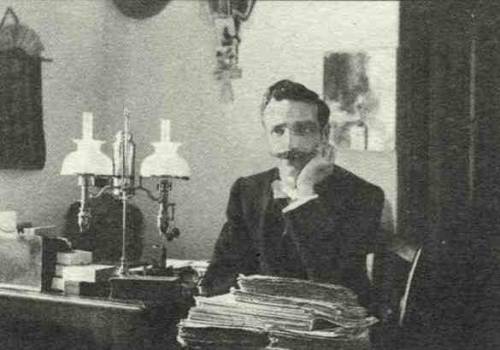#gregorios xenopoulos
Στις 9 Δεκεμβρίου 1867 γεννιέται στην Κωνσταντινούπολη ο ζακυνθινός συγγραφέας Γρηγόριος Ξενόπουλος.
On December 9, 1867, the Zakynthian writer Grigorios Xenopoulos was born in Constantinople.His family moved to Zakynthos soon after, where Gregorios spent his youth until 1883, when he enrolled in the University of Athens to study physics and mathematics. He never completed his studies: already in the first year, he had begun writing literature, which was his sole source of income at the time.
Xenopoulos was a prolific writer. He wrote over 80 novels and a large number of short stories. He first became known to the literary world through his first novel: “Ο Άνθρωπος του Κόσμου” (O anthropos tou kosmou, “Man of the world”). This novel and his next one, “Nikolas Sigalos” (1890), written in the New Athenian style, were not successful. He then turned for inspiration to his birthplace, Zakynthos, and as a result wrote some of his best novels, such as “Magaret Stefa” (1893) and Κόκκινος Βράχος (Kokkinos Vrachos, “Red Rock”, 1905). These were followed by further novels in the New Athenian style: “Ο πόλεμος” (O polemos, “War”, 1914), “Οι Μυστικοί Αρραβώνες” (I mystikoi aravones, “The Secret Engagement”, 1915) and the Ionian School novel “Laura” (1915), which was also one of his most admired. But his most ambitious work was the trilogy: “Πλούσιοι και φτωχοί” (plousioi kai ftochoi, “The Rich and the Poor”, 1919), “Τίμιοι και άτιμοι” (Timioi kai atimoi, “The Honest and the Dishonest”, 1921), “Τυχεροί και άτυχοι” (Tycheroi kai atychoi, “The Lucky and the Unlucky”, 1924). Other novels include: “Αναδυομένη” (Anadyomeni, 1923), “Ισαβέλλα” (Isabella, 1923), “Τερέζα Βάρμα-Δακόστα” (Teresa Varma-Dakosta, 1925).His novels are set in Athens and Zakynthos, and he is considered to be a proponent of the “urban novel”. The main theme of his works is love, particularly love between people of different classes. His work has been criticised for putting quantity ahead of quality, with many sequels, and for pandering to the tastes of his readers with scenes which were sexually provocative for the period. However he has also been praised for his narrative strength and ability to hold the readers attention.
More on:Wikipedia
Post link

